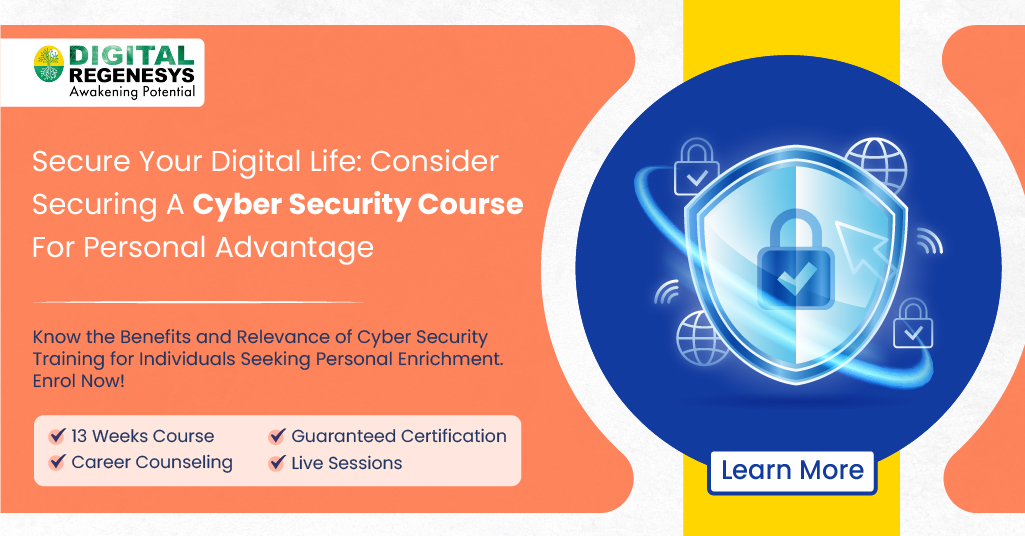Who Should Consider a Cyber Security Course for Personal Knowledge?

Cyber security has emerged as a pressing concern in today’s digital age due to the growing number of cyber threats. Not to mention! The importance of cyber security is becoming increasingly recognised across the globe. Today, from online banking to social media accounts, we entrust much personal data to the digital sphere. However, with this reliance, the risk of cyberattacks and data breaches is rising. Therefore, understanding cyber security is not just for professionals; on the other hand, it is a valuable skill for everyone. So, considering cyber security courses for personal knowledge is a clever move.
A cyber security course equips learners with the fundamental concepts of cyber security, expanding their knowledge and skills to defend themselves from potential cyber-attacks. So, who should enrol in a cyber security course to gain personal knowledge? Let’s take a closer look.
Importance of Cyber Security Courses
Studying cyber security is broad and constantly evolving with the emergence of new technologies and tools. In today’s digital age, taking cyber security courses offers many benefits, including protecting personal data from theft and fraud, preventing cyberattacks through proactive measures, and enhancing online safety by adopting best practices. As a result, there is a lot of demand for this particular course.
Due to the increase in cyber-attacks, people seek solutions to secure their data and systems. Therefore, learning about common cyber threats and vulnerabilities empowers individuals to secure their devices, networks, and IoT (Internet of Things) devices from malware, viruses, and other cyber threats. Besides, today, cyber security has a lot of potential for development since cybercriminals will continue to pose threats as long as technology advances. So, let’s briefly look at why people need cyber security training for their personal knowledge:
- To learn how human conduct or error can potentially result in substantial data breaches or any other security breaches.
- To help identify hazards like phishing and social engineering attacks and respond appropriately.
- To teach secure email handling and browsing techniques to avoid unintentionally downloading malware or falling victim to cyber schemes.
- To train to safeguard sensitive or personal information to avert unauthorised access or disruptions.
- To be informed about the most current threats and optimal methodologies to adapt to the changing cyber threat landscape.
Who Should Enrol in Cyber Security Course For Personal Knowledge?
Courses for cyber security have gained significant advantages in the current digital age due to the critical state of growing cyber threats. These courses teach individuals the fundamental concepts to comprehend and address cyber threats and attacks. Besides, they accommodate individuals lacking the technical expertise to learn about the practical cyber security measures applicable in everyday situations.
So, let’s explore the individuals who need to enrol in cyber security courses for personal knowledge:
-
Everyday Internet Users:
If you are an Internet user, you are likely vulnerable to cyber threats. For instance, when you shop, chat, or browse online, you can be prone to cyber issues like phishing, malware, and identity theft. Thus, learning about cyber security can help shield yourself from these problems. Consequently, enroling in a cyber security course can teach you to spot suspicious activity. Besides, you can keep your devices and accounts safe and practice smart online habits.
-
Job Seekers:
Cyber security skills are highly demanded across different industries in today’s job market. Hence, if you are looking to progress in your current career or move into a new field, gaining cyber security knowledge can boost your employability and open up new opportunities. Therefore, when you enrol in a cyber security course, you can equip yourself with the skills and knowledge required to pursue roles like cyber security analyst, network administrator, IT security specialist and more.
-
Remote Workers:
Today, remote work has become increasingly common. That means individuals who rely on digital tools and remote communication must prioritise cyber security. Whether you’re working remotely from around the world or from the comfort of your home, understanding cyber security best practices through cyber security courses can help protect your sensitive data, maintain the confidentiality of your work, and prevent security breaches.
-
Parents and Guardians:
Ensuring your children’s online safety is crucial as a parent or guardian. With kids spending more time online for school, fun, and staying connected, they face risks like cyberbullying and inappropriate content. By taking a cyber security course, you can learn to set parental controls, teach your kids about online dangers, and create a secure digital space for them to explore.
-
Small Business Entrepreneurs:
Small businesses can be easy targets for cybercriminals as they may not have strong security measures in place. If you own or plan to start a small business, taking cyber security courses for beginners can help protect your company’s sensitive information, customer data, and financial assets. You will also learn how to implement effective security measures, develop a cyber security strategy, and respond to cyber threats promptly.
-
Senior Citizens:
Cybercriminals frequently target senior citizens due to their limited experience with technology and vulnerability to scams. Taking a cyber security course can empower older adults to navigate the digital landscape safely, safeguard their personal information, and avoid becoming victims of online fraud and exploitation. Besides, they can recognise common scams, secure their devices, and stay safe while using the Internet.
Conclusion
Today, cyber security is no longer just a concern for IT experts and organisations. It’s a crucial skill everyone should have. Whether you’re an everyday internet user, a parent, or a remote worker, taking cyber security courses can give you the knowledge and awareness to use the digital landscape safely. Through these courses, you can learn the basics of cyber security and its best practices to protect yourself and your online assets from cyber threats now and in the future.
Therefore, investing in cyber security education is essential for staying secure in today’s increasingly digital age. That is why it is essential to find the best ed-tech platforms to choose the right cyber security course. Digital Regenesys, Silicon Valley’s leading ed-tech platform with a global presence in multiple countries, including the USA, India, South Africa, Kenya, Nigeria, and more, is your right choice. Within 13 weeks, you can complete the Cyber Security Course and develop practical skills to defend yourself from cyber attacks. Enrol Now!
FAQs on Who Should Consider a Cyber Security Course for Personal Knowledge?
Last Updated: 4 October 2024

